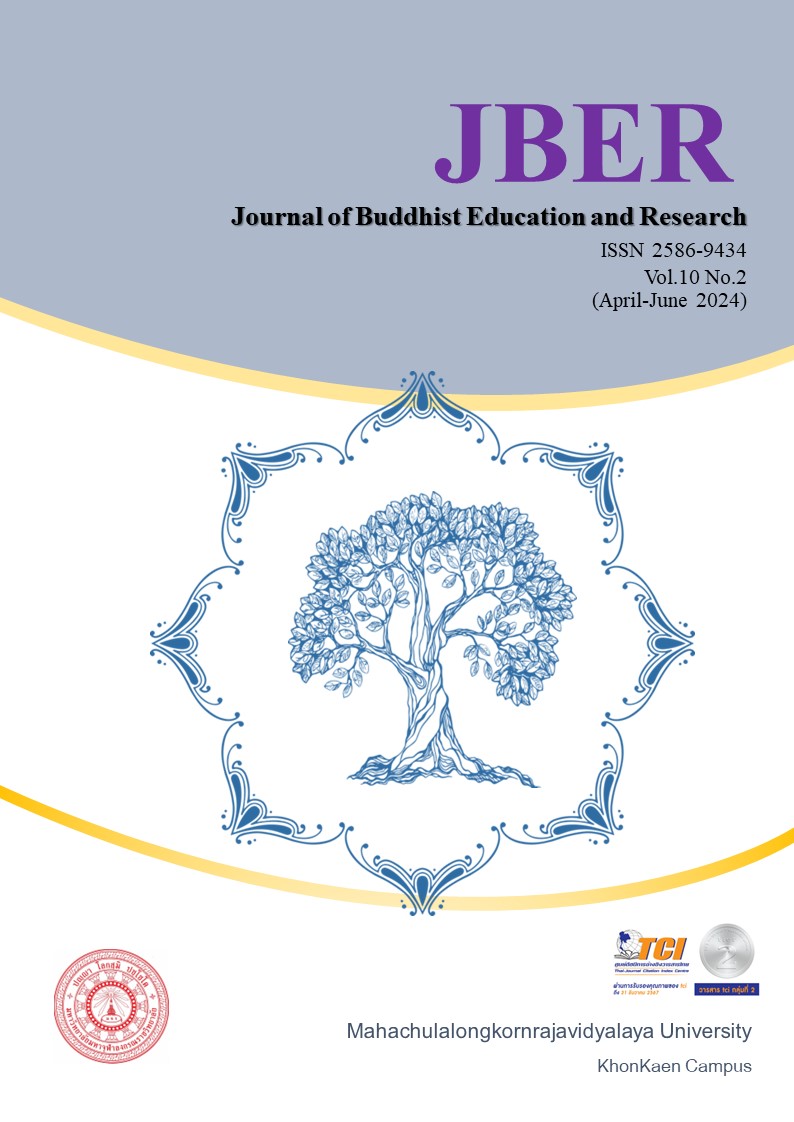AN ANALYSIS OF THE RELATIONSHIP BETWEEN THE YONISOMANASIKARA PRINCIPLE AND THE EIGHT WORLDLY DHARMAS IN BUDDHISM
Keywords:
Yonisomanasikra, The 8 worldly principles, RelationshipsAbstract
This research article It is a study and analysis of the relationship between the principles of Yonisomanasikra and the 8 worldly principles in Buddhism, using the concepts and theories of the principles of Yonisomanasikra. and the 8 worldly principles in the Buddhist scriptures It is a research framework. This research study is a document research study. By studying information about analyzing the relationship between the principles of Yonisomanasikra and the 8 worldly principles in Buddhism. By collecting document information from various sources. The research results found that, The study of yonisomanasikra thinking is thinking by investigating causes and factors. Thinking in a way that recognizes benefits and solutions. and the perception of having friends towards forgiving others Yonisomanasikra It is considered the highest intellectual development process for Buddhist adherents. With this way of thinking, people understand the conditions of life, the conditions of society, and the conditions of the world. Able to organize one's own life, organize society and all environments correctly in accordance with natural laws, the 8 worldly principles have come into contact. If people trust to be neutral Do not be fascinated by the emotions of the natural world. Life will always be happy. Use your intellect to consider frequently what has happened. It must have deteriorated into normal things. We were born as human beings. Everyone must fall into the 8 worldly principles, so that there will be no need for sorrow and suffering. able to live happily in this world. Knowledge from this research If both principles are applied together Yosomanasikra and the Eight Worlds of Dhamma allow humans to better understand living in today's society. If humans understand the truth of life then able to live together in society normally and happily.
References
พรภิรมย์ ยอดบุญ และพระพรหมพิริยะ มาลัยรักษ. (๒๕๖๕). การจัดการเรียนรู้ตามหลักโยนิโสมนสิการเพื่อเสริมสร้างคุณลักษณะอันพึงประสงค์ของผู้เรียน. วารสาร มจร พุทธโสธรปริทรรศน์ ปีที่ ๒ ฉบับที่ ๑ (มกราคม-มิถุนายน ๒๕๖๕)
พระครูกาญจนธรรมาภรณ์ และคณะ. (๒๕๖๖). โลกธรรม๘ ในชีวิตประจำวัน. วารสารพุทธจิตวิทยา ปีที่๘ ฉบับที่๑ (มกราคม-เมษายน ๒๕๖๖): ๑๑๐.
พระพรหมคุณาภรณ์ (ป.อ. ปยุตฺโต). (๒๕๔๙). การดูแลสุขภาวะองค์รวมแนวพุทธ. (พิมพ์ครั้งที่ ๑๐). กรุงเทพฯมหานคร: โรงพิมพ์ชุมนุมสหกวรณ์การเกษตรแห่งประเทศไทย.
พระมหาณัฐพงษ์ นาคถ้ำ และจันทร์ธิภา แสวงทรัพย์. (๒๕๖๕). พุทธวิธีในการเผชิญโลกธรรม. มหาวิทยาลัยมหาจุฬาลงกรณราชวิทยาลัย Received: ๒๐๒๓-๐๒-๑๗; Revised: ๒๐๒๓-๐๓- ๒๕; Accepted: ๒๐๒๓-๐๓-๒๙.
พระสุนทรา วรสาโร จันทร์โต. (๒๕๖๒). โยนิโสมนสิการของผู้บริหารโรงเรียนพระปริยัติธรรมแผนกสามัญศึกษา. ปรัชญาดุษฎีบัณฑิต สาขาวิชาการบริหารการศึกษา แบบ ๒.๑ ปรัชญาดุษฎีบัณฑิต ภาควิชาการบริหารการศึกษา บัณฑิตวิทยาลัย มหาวิทยาลัยศิลปากร ปีการศึกษา ๒๕๖๒.
วิลาสินี วัฒนมงคล. (๒๕๖๐). การคิดตามหลักโยนิโสมนสิการ เพื่อเสริมสร้างทักษะการคิด และการเรียนรู้ของเด็กและเยาวชนในศตวรรษที่ ๒๑. วารสารปรัชญาปริทรรศน์ ปีที่ ๒๒ ฉบับที่ ๑ มกราคม – สิงหาคม ๒๕๖๐.
อำไพ ลีละรัตนวงศ์และ สุวัฒสัน รักขันโท. (๒๕๖๔). สุขเกษียณด้วยหลักธรรมตามแนวพุทธจิตวิทยา. วารสาร มจร มนุษยศาสตร์ปริทรรศน์ ปีที่ ๗ ฉบับที่ ๑ (มกราคม – มิถุนายน), ๒๕๖๔.
Downloads
Published
How to Cite
Issue
Section
License

This work is licensed under a Creative Commons Attribution-NonCommercial-NoDerivatives 4.0 International License.





